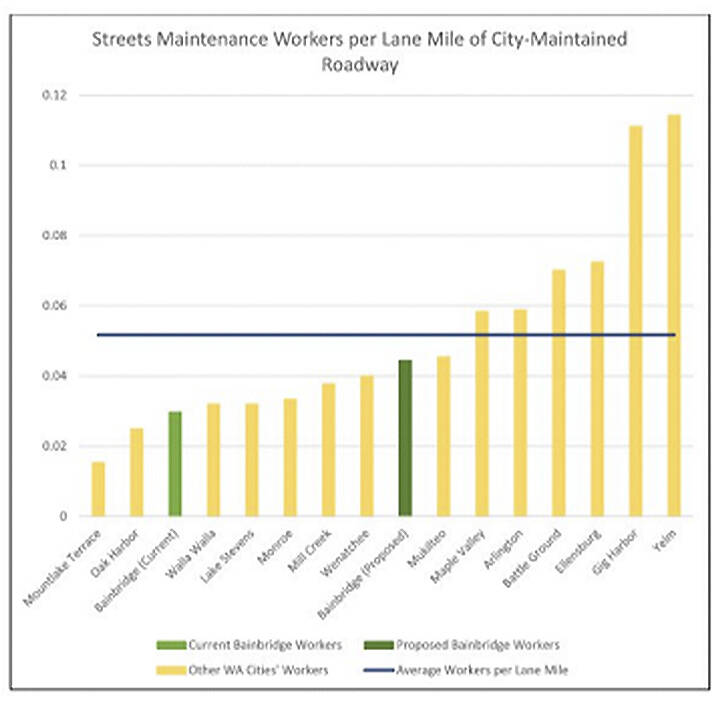Bainbridge city staff is concerned about lack of maintenance, leading to deteriorating roads and buildings.
But after hearing about that at a study session Tuesday, members of the City Council want to take those requests even further to make sure they are looked at with climate change and equity in mind.
Mayor Joe Deets acted like it’s a no brainer that the city needs to do a better job overall with maintenance, as the council was told only about 60% of what should be done is being done. “That’s the nuts and bolts of what we do,” he said. “But how can we start” to use “more climate friendly materials?”
City manager Blair King said there are ways to do that. “It’s more expensive, and that becomes part of the tradeoff.”
Public Works director Chris Wierzbicki said the city already grinds up asphalt and reuses it onsite of projects, saving money and helping the environment.
King said a big problem is urban runoff. He said the city needs to increase its amount of storm drain infrastructure.
Back to staff’s original request, helping pavement last longer with proper maintenance also would help.
King said BI spends about $500,000 a year maintaining its 270 lane miles of pavement when studies say twice that amount is needed. City staff is hoping for $1 million a year in the next two-year budget. He also said regionally, for that many lane miles, the average number of employees is 12, while BI has eight.
Also, the city has one person taking care of 90,000-square feet of city property, when the average is one person for every 50,000-square feet. Wierzbicki said that puts the city behind in both areas, and it hopes to address that during the budget process later this year.
Preventative maintenance aims to minimize unplanned downtime and repair costs, a city memo says. And it can save taxpayers money over reactive maintenance. The memo asks that a City Facilities Capital and Maintenance Fund be established with a $1 million annual set-aside. It says for a few years no crack sealing, which helps roads last longer. Only about 50% of roadside work has been done, resulting in ponding and poor drainage, which adds to pavement deterioration.
The city owns a variety of facilities including City Hall, the police and court facilities, the Senior Center and various storage, park, farm and other investments that must be maintained. The city memo says it also owns 70 acres of parks and 9 acres of building grounds. King said if things aren’t maintained they depreciate in value. He said if a fund is set up if something happens requiring a major expenditure it can help pay for it, rather than having “to swallow that expenditure in one budget process.”
Regarding roads, Wierzbicki said no more city staff would be needed to be hired because pavement preservation is contracted out. City staff does street maintenance, like sweeping, sidewalk repair, etc.
In a presentation, Wierzbicki showed that BI is ranked 13th out of 15 cities in number of staff. And in staff per miles of streets BI is dead last at 15th. Wierzbicki said that’s because staff has to cover the entire island. “We spend a lot of time getting to where work needs to be done instead of doing the work,” he said.
Councilmember Kirsten Hytopoulos said, “We chose to take that on” when we incorporated the entire island.” She said taking care of what the city owns is “one of our core functions.” Before we spend money on extras “we know are morally right,” we need to commit at least to the minimum standard in maintenance.
Councilmember Leslie Schneider said she wants to be sure road crews not only work on streets, but also the shoulders to benefit bicyclists.
Wierzbicki said with the staff he has and so much work some things get left behind. “It takes a toll on staff morale over time,” he said.
Also at the meeting the council talked about the real estate excise tax. Finance director Dwayne Pitts said 1/2 of 1% of real estate sales in BI is put into two accounts.
The funds are restricted for paying debt, maintenance such as street repair and capital projects. About $3.4 million is expected this year. The average over the last 10 years is $2.8 million, with a low of $1.3 million in 2013 and a high of $4.2 million last year. This coming year Pitts expects $2.4 million because while prices of real estate are going up there is no supply.
Councilmembers agreed that some of that money should go to affordable housing projects. “Some share of this should go to make that happen,” Councilmember Jon Quitslund said.
Hytopoulos agreed. She said the city is making money on sales of expensive homes, so equity would mean putting some of those funds into homes for lower-income families. That’s where funds have to come from since BI does not want intensive development. “We have to balance our interests,” she said.
She asked if the real estate excise tax could be increased. King said no, it’s already at the maximum, but the city could have its own dedicated tax to help with affordable housing. And some communities charge impact fees to developers.



